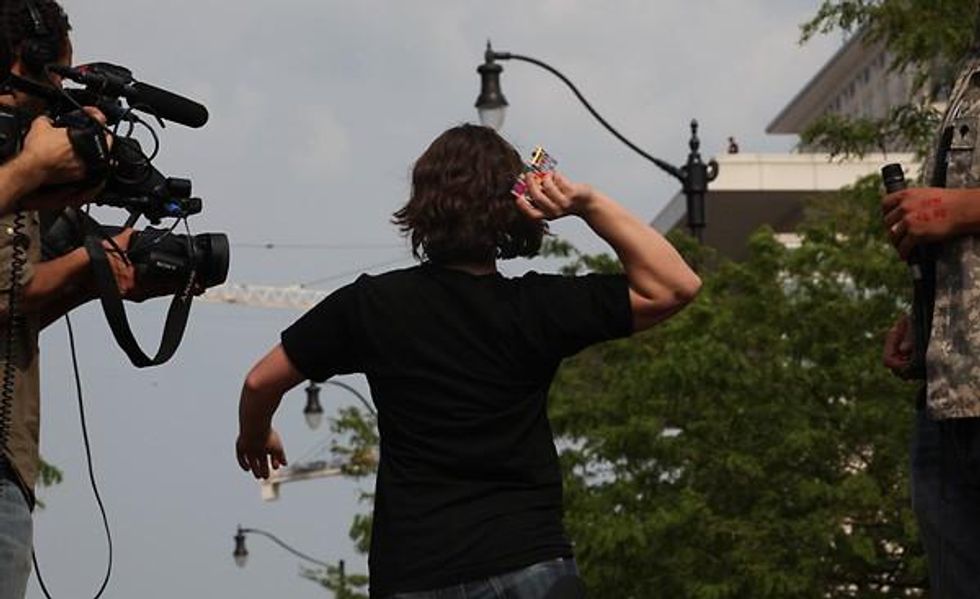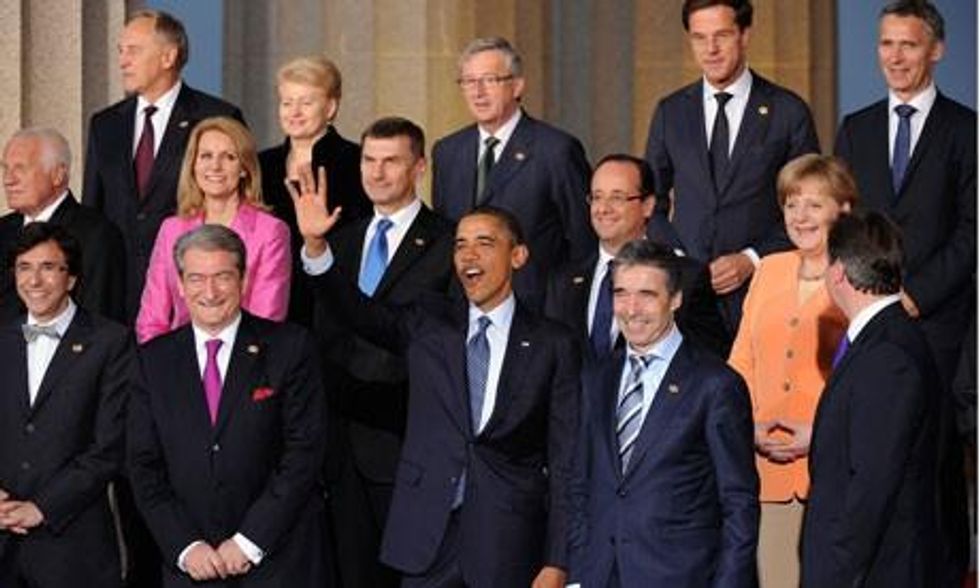

SUBSCRIBE TO OUR FREE NEWSLETTER
Daily news & progressive opinion—funded by the people, not the corporations—delivered straight to your inbox.
5
#000000
#FFFFFF
To donate by check, phone, or other method, see our More Ways to Give page.


Daily news & progressive opinion—funded by the people, not the corporations—delivered straight to your inbox.

"I have only one word, and it is shame."
"This is for the people of Iraq and Afghanistan."
"Mostly, I'm sorry. I'm sorry to all of you. I am sorry..."
In the shadow of the Nato summit, under the watchful eyes of a phalanx of full-black-clad riot police, dozens of former servicemen and women in uniform, veterans of the Iraq and Afghanistan wars, threw away their medals, with apologies. It was one of the most moving experiences many of us had witnessed in our lives. It is hard to describe in words. I couldn't get the lump out of my throat. Out of the corner of my eye, I caught a woman next to me crying. Their words, their voices, crackling under the emotion of their courageous act, breaking under the weight of the pain, the trauma, their anger, sadness, and hope - theirs was a heroic and beautiful act, a moving ceremony. It was a privilege to be there with these women and men who served in our wars.
Operation Iraqi Freedom medal. Tossed. Global War on Terror medal. Thrown. National Defense medal. Pitched. Marine Corps Good Conduct medal. Flung. Navy and Marine Corps medal. Chucked.
Most of the reporting of the demonstrations that met the summit will focus on the minor violence, on the few clashes between protesters and police, on the blood, on everything that happened after the peaceful march was over. In our sad world of spectacle, the pushing and shoving will be all that gets our attention. It is a pity.

Because what was truly remarkable today was the American servicewomen and men tossing their medals back at Nato. In a mixture of sadness, shame, anger, and pride, of trauma, sorrow, and pain, some looking back at their time in Iraq and Afghanistan, some healing from PTSD, others chanting Occupy slogans, these men and women showed a type of courage that the Nato leaders should have been forced to watch. Tragically, our leaders were busy posing for photo ops. They should have been forced to listen to these courageous men and women, to their veterans. It is their loss, ultimately.
Many of these men and women urged us to do something to set straight the havoc that we have wreaked in these various occupations. Some mentioned a memorial for the tens of thousands of civilians killed in Afghanistan or more than 100,000 civilians killed in Iraq. Others offered their apologies. Still others shared their pain, their torments, their nightmares. All of them spoke truth. Perhaps that was their greatest gift of peace.
If only the Nato leaders had listened.
These courageous women and men, these veterans brought to a close a remarkably peaceful anti-Nato march with more than 10,000 protesters - supported by so many more who chanted with them along the route.
"I am returning my medal today because I want to live by my conscience, rather than be a prisoner of it."
"I apologise to the Iraqi and Afghani people for destroying your countries."
"I don't want these anymore."
Dear Common Dreams reader, The U.S. is on a fast track to authoritarianism like nothing I've ever seen. Meanwhile, corporate news outlets are utterly capitulating to Trump, twisting their coverage to avoid drawing his ire while lining up to stuff cash in his pockets. That's why I believe that Common Dreams is doing the best and most consequential reporting that we've ever done. Our small but mighty team is a progressive reporting powerhouse, covering the news every day that the corporate media never will. Our mission has always been simple: To inform. To inspire. And to ignite change for the common good. Now here's the key piece that I want all our readers to understand: None of this would be possible without your financial support. That's not just some fundraising cliche. It's the absolute and literal truth. We don't accept corporate advertising and never will. We don't have a paywall because we don't think people should be blocked from critical news based on their ability to pay. Everything we do is funded by the donations of readers like you. Will you donate now to help power the nonprofit, independent reporting of Common Dreams? Thank you for being a vital member of our community. Together, we can keep independent journalism alive when it’s needed most. - Craig Brown, Co-founder |

"I have only one word, and it is shame."
"This is for the people of Iraq and Afghanistan."
"Mostly, I'm sorry. I'm sorry to all of you. I am sorry..."
In the shadow of the Nato summit, under the watchful eyes of a phalanx of full-black-clad riot police, dozens of former servicemen and women in uniform, veterans of the Iraq and Afghanistan wars, threw away their medals, with apologies. It was one of the most moving experiences many of us had witnessed in our lives. It is hard to describe in words. I couldn't get the lump out of my throat. Out of the corner of my eye, I caught a woman next to me crying. Their words, their voices, crackling under the emotion of their courageous act, breaking under the weight of the pain, the trauma, their anger, sadness, and hope - theirs was a heroic and beautiful act, a moving ceremony. It was a privilege to be there with these women and men who served in our wars.
Operation Iraqi Freedom medal. Tossed. Global War on Terror medal. Thrown. National Defense medal. Pitched. Marine Corps Good Conduct medal. Flung. Navy and Marine Corps medal. Chucked.
Most of the reporting of the demonstrations that met the summit will focus on the minor violence, on the few clashes between protesters and police, on the blood, on everything that happened after the peaceful march was over. In our sad world of spectacle, the pushing and shoving will be all that gets our attention. It is a pity.

Because what was truly remarkable today was the American servicewomen and men tossing their medals back at Nato. In a mixture of sadness, shame, anger, and pride, of trauma, sorrow, and pain, some looking back at their time in Iraq and Afghanistan, some healing from PTSD, others chanting Occupy slogans, these men and women showed a type of courage that the Nato leaders should have been forced to watch. Tragically, our leaders were busy posing for photo ops. They should have been forced to listen to these courageous men and women, to their veterans. It is their loss, ultimately.
Many of these men and women urged us to do something to set straight the havoc that we have wreaked in these various occupations. Some mentioned a memorial for the tens of thousands of civilians killed in Afghanistan or more than 100,000 civilians killed in Iraq. Others offered their apologies. Still others shared their pain, their torments, their nightmares. All of them spoke truth. Perhaps that was their greatest gift of peace.
If only the Nato leaders had listened.
These courageous women and men, these veterans brought to a close a remarkably peaceful anti-Nato march with more than 10,000 protesters - supported by so many more who chanted with them along the route.
"I am returning my medal today because I want to live by my conscience, rather than be a prisoner of it."
"I apologise to the Iraqi and Afghani people for destroying your countries."
"I don't want these anymore."

"I have only one word, and it is shame."
"This is for the people of Iraq and Afghanistan."
"Mostly, I'm sorry. I'm sorry to all of you. I am sorry..."
In the shadow of the Nato summit, under the watchful eyes of a phalanx of full-black-clad riot police, dozens of former servicemen and women in uniform, veterans of the Iraq and Afghanistan wars, threw away their medals, with apologies. It was one of the most moving experiences many of us had witnessed in our lives. It is hard to describe in words. I couldn't get the lump out of my throat. Out of the corner of my eye, I caught a woman next to me crying. Their words, their voices, crackling under the emotion of their courageous act, breaking under the weight of the pain, the trauma, their anger, sadness, and hope - theirs was a heroic and beautiful act, a moving ceremony. It was a privilege to be there with these women and men who served in our wars.
Operation Iraqi Freedom medal. Tossed. Global War on Terror medal. Thrown. National Defense medal. Pitched. Marine Corps Good Conduct medal. Flung. Navy and Marine Corps medal. Chucked.
Most of the reporting of the demonstrations that met the summit will focus on the minor violence, on the few clashes between protesters and police, on the blood, on everything that happened after the peaceful march was over. In our sad world of spectacle, the pushing and shoving will be all that gets our attention. It is a pity.

Because what was truly remarkable today was the American servicewomen and men tossing their medals back at Nato. In a mixture of sadness, shame, anger, and pride, of trauma, sorrow, and pain, some looking back at their time in Iraq and Afghanistan, some healing from PTSD, others chanting Occupy slogans, these men and women showed a type of courage that the Nato leaders should have been forced to watch. Tragically, our leaders were busy posing for photo ops. They should have been forced to listen to these courageous men and women, to their veterans. It is their loss, ultimately.
Many of these men and women urged us to do something to set straight the havoc that we have wreaked in these various occupations. Some mentioned a memorial for the tens of thousands of civilians killed in Afghanistan or more than 100,000 civilians killed in Iraq. Others offered their apologies. Still others shared their pain, their torments, their nightmares. All of them spoke truth. Perhaps that was their greatest gift of peace.
If only the Nato leaders had listened.
These courageous women and men, these veterans brought to a close a remarkably peaceful anti-Nato march with more than 10,000 protesters - supported by so many more who chanted with them along the route.
"I am returning my medal today because I want to live by my conscience, rather than be a prisoner of it."
"I apologise to the Iraqi and Afghani people for destroying your countries."
"I don't want these anymore."